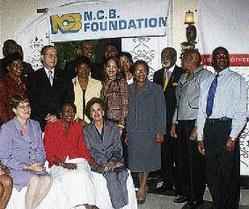
Ainsley Reid, head of the Jamaica Association of Sero-Positives (standing, far right) among the group of principals and participants at the launch of the Jamaica Business Council on HIV/AIDS at the Terra Nova Hotel in St. Andrew, in November 2007.
Programme Officer Caribbean Council of Churches and Co-founder of the Jamaican Network of Seropositives, Ainsley Reid, has been living with HIV since 1992. He recently told his experience with children at the Willowdene Kindergarten and Prep School in Spanish Town.
"On November 23, I had the privilege of working with a group of young people in the Community AIDS response and Empathy Society(CARES), a faith-based organisation in Spanish Town. On the last day of the training, they visited
Willowdene High in Spanish Town. I had the difficult task of speaking to the kindergarten and prep school.
"After working the children into a frenzy with HIV/AIDS Basic Facts - having them rush to the front of the auditorium to ask a few questions, I felt very pleased since I was getting their interest, attention and involvement.
Reid's talks reinforce the idea that one cannot contract the virus from everyday contact. "'Can you get it by hugging me?' I asked the children, to which their reply was a resounding 'No!' I felt so pleased. It was then that I challenged the audience (of almost 500) to come and give Uncle Ainsley a big hug. Big mistake. Immediately after I made the request, they all dashed like crazy cartoon characters, some throwing themselves in my arms, others falling on top of each other to reach, touch and hug me. It was a frightening, crazy, yet fun experience."
One of the important lessons from that experience, Reid says, is that children are grasping the important principle that sero-positives can look normal and live the normal life of many in the society and thus must be accepted. This message still has to take hold among the nation's adults, both in and out of the workplace.
Shared information
The Jamaica Business Council on HIV/AIDS was founded in 2006 with the aim of providing a cohesive and coordinated approach among enterprises in formulating HIV/AIDS policies and programmes on the basis of shared information.
Among the various organisations and companies offering their support to the programme is the NCB Foundation, which has contributed $2 million to the JBCHA and is proactively supporting the campaign to strengthen the programme to increase awareness and end discrimination. The foundation is among those recognising the vital role that greater awareness can play in reducing the incidence of new infections - in the workplace and elsewhere - and is acting to support the campaign.
"We understand that by helping to remove the stigma from persons living with the virus, we are encouraging more voluntary testing which will help improve the management of the disease and ultimately, help bring the numbers down," said Sheree Martin of the NCB Foundation.
'We understand that by helping to remove the stigma from persons living with the virus, we are encouraging more voluntary testing which will help improve the management of the disease and ultimately, help bring the numbers down.'

